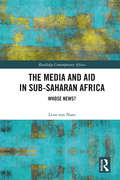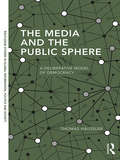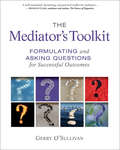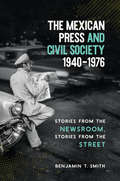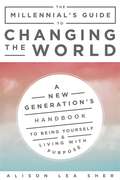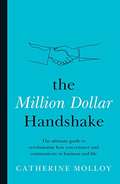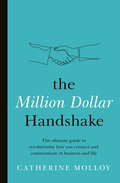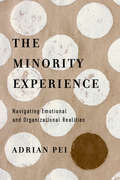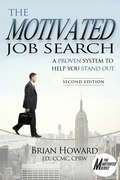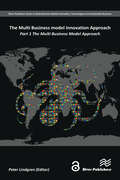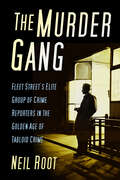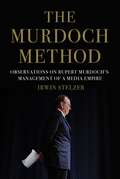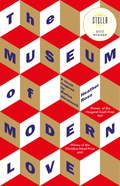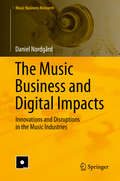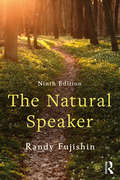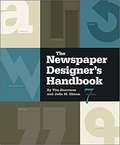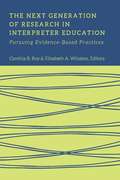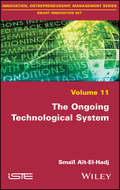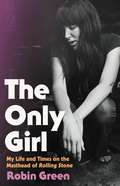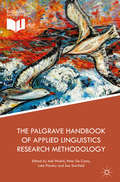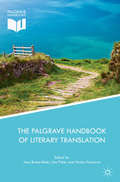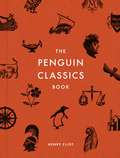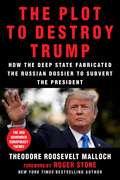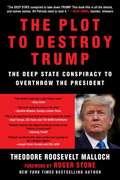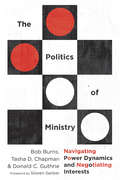- Table View
- List View
The Media and Aid in Sub-Saharan Africa: Whose News? (Routledge Contemporary Africa)
by Lena von NasoNews coverage on Africa is closely connected not only with how Western audiences see the continent, but also with how a wide Western audience builds its opinion on issues that carry consequences for the public's and governments' support and policy towards development aid. The Western media reinforce a picture of a continent that drowns in chaos, is dominated by conflicts, diseases, corruption and failed democratisation. Whose interests lie behind that? How does foreign news on sub-Saharan Africa emerge, which actors are relevant in its making, and on the basis of what interests do these actors shape the coverage that is then presented as 'neutral information' to a broad international audience? Closely examining the relationship between foreign correspondents of international news media and humanitarian organisations, Lena von Naso shows how the aid and media sectors cooperate in Africa in a unique way. Based on more than 70 interviews with foreign correspondents and aid workers operating across Africa, the book argues that the changing nature of foreign news and of aid is forcing them to form a deep co-dependency that is having a serious and largely unnoticed effect on Western news coverage. This comprehensive examination of a new paradigm will interest students and scholars of media and journalism, African studies, development and humanitarian studies and the aid and media communities operating across Africa.
The Media and the Public Sphere: A Deliberative Model of Democracy (Routledge Studies in Global Information, Politics and Society)
by Thomas HäusslerAt the heart of modern democracy lies the public sphere, which is most centrally shaped by those actors that integrate it discursively: the mass media. The media draw together the different strands of political debates; they grant access to some actors and arguments while excluding others and thus decisively mould the political process. In this book, Thomas Häussler examines how the media reflect and react to the wider context in which they are embedded. More specifically, he focuses on whether their discourse demonstrates systematic differences with regard to the two main public sphere types that they co-constitute, according to deliberative theory, focussing in particular on the work of Jürgen Habermas. The Media and the Public Sphere promotes a deeper and more detailed understanding of the political process by foregrounding the complex relationships between the media and the public discourse they constitute. It examines how the media co-create relationships of power, analyses the structure of these discursive networks and illuminates the effects that different deliberative coalition types have on political debates.
The Mediator's Toolkit: Formulating and Asking Questions for Successful Outcomes
by Gerry O'Sullivan“Dives deep into the psychology of information and emotion in conflict situations . . . Highly recommended for facilitators and negotiators as well as mediators.” —Jennifer Beer, author of The Mediator’s Handbook and negotiation instructor at Wharton School, University of PennsylvaniaKnowing how to formulate and ask incisive questions to get to the core of a conflict, challenge entrenched thinking, and shift perspectives is the key to successful conflict resolution. The Mediator’s Toolkit employs the author’s powerful “S Questions Model” to provide readers with the skills and tools to do just that. It addresses four dimensions of successful questions for mediation: the subject matter dimension, the structure dimension, the information-seeking dimension, and the shifting thinking dimension. The toolkit clearly explains:The theory behind each question type, including exploration of relevant neuroscience and psychologyThe purpose of different types of questionsHow the questions workWhen to use different types of questionsHow to build and apply questions to mediation in a non-threatening wayThis essential practical guide will radically sharpen, focus, and improve the questioning skills of qualified mediators, students, lecturers, trainers, and those using questions to challenge and effect change, in any context.
The Mexican Press and Civil Society, 1940–1976: Stories from the Newsroom, Stories from the Street
by Benjamin T. SmithMexico today is one of the most dangerous places in the world to report the news, and Mexicans have taken to the street to defend freedom of expression. As Benjamin T. Smith demonstrates in this history of the press and civil society, the cycle of violent repression and protest over journalism is nothing new. He traces it back to the growth in newspaper production and reading publics between 1940 and 1976, when a national thirst for tabloids, crime sheets, and magazines reached far beyond the middle class.As Mexicans began to view local and national events through the prism of journalism, everyday politics changed radically. Even while lauding the liberty of the press, the state developed an arsenal of methods to control what was printed, including sophisticated spin and misdirection techniques, covert financial payments, and campaigns of threats, imprisonment, beatings, and even murder. The press was also pressured by media monopolists tacking between government demands and public expectations to maximize profits, and by coalitions of ordinary citizens demanding that local newspapers publicize stories of corruption, incompetence, and state violence. Since the Cold War, both in Mexico City and in the provinces, a robust radical journalism has posed challenges to government forces.
The Millennial's Guide to Changing the World: A New Generation's Handbook to Being Yourself and Living with Purpose
by Alison Lea SherA guide and blueprint to a purposeful millennial existence—and how we can make a difference. What does it mean to be a millennial in this chaotic world? Beyond Snapchat and Tinder, the consumerist culture we’ve inherited, and quarter-life crises, can a millennial aspire to more? Alison Lea Sher argues, yes, we can! Packing herself up in an RV, Sher embarks on a road trip in hopes of starting a conversation about what it means to grow up in America, post-Great Recession. Interviewing 150 of her millennial peers as they begin their adult lives—from kids heading straight to Wall Street after college to those sleeping on it—Sher asks: “Who are you; what should you do; and how can you step into your destiny as a stakeholder in society?” The Millennial’s Guide to Changing the World is a one-of-a-kind ethnographic study on the spotlighted millennial generation, as told by millennials—the largest generation in US history that is now transitioning from adolescence to adulthood. As millennials embark on a young adult quest during a frightening time, how can they enlist the idealism, values, and resistance politics they are so well-known for to discover a sense of self and purpose? Learn how to: “Adult”—and not in the way society defines itRide the technology revolution, instead of letting it ride youBe ethical, inclusive, and sex-positive in your relationshipsResist the corporate oligarchy we live inRecognize privilege, embrace diversity, and fight for equalitySave the earth, literally With intimate stories, ethnographic research, and practical tips, The Millennial’s Guide to Changing the World will inspire every young person, showing them how to optimize their coming-of-age potential in a world that desperately needs it.
The Million Dollar Handshake: The ultimate guide to revolutionise how you connect and communicate in business and life
by Catherine MolloyThe Million Dollar Handshake is about more than making money - it is also about helping you feel a million dollars.First impressions do count - and few have as much impact as your handshake. A handshake can let the other person know if we are nervous, over-excited, confident or interested in them, and it can tell us so much about that person too, once we learn the signs.A great handshake can lead to a positive outcome, help secure a deal and result in an ongoing relationship. We can make a good or bad impression within just seven seconds of meeting someone.This book shows you how to create a great first impression; offers advice on how to let the other person see that you are interested in them, that they can trust and depend on you; and delves into what you do and don't want your handshake to convey.The Million Dollar Handshake will teach you how to communicate better in all parts of your life, starting with those crucial first seven seconds. But the skills you'll learn won't stop there, because as you realise how your handshake reveals who you are, you'll be inspired to make the positive changes that will result in better first-time and ongoing communication with others.Includes access to exclusive online content featuring interactive training, worksheets an videos.
The Million Dollar Handshake: The ultimate guide to revolutionise how you connect in business and life
by Catherine MolloyThe Million Dollar Handshake is about more than making money - it is also about helping you feel a million dollars.First impressions do count - and few have as much impact as your handshake. A handshake can let the other person know if we are nervous, over-excited, confident or interested in them, and it can tell us so much about that person too, once we learn the signs.A great handshake can lead to a positive outcome, help secure a deal and result in an ongoing relationship. We can make a good or bad impression within just seven seconds of meeting someone.This book shows you how to create a great first impression; offers advice on how to let the other person see that you are interested in them, that they can trust and depend on you; and delves into what you do and don't want your handshake to convey.The Million Dollar Handshake will teach you how to communicate better in all parts of yourlife, starting with those crucial first seven seconds. But the skills you'll learn won't stopthere, because as you realise how your handshake reveals who you are, you'll be inspiredto make the positive changes that will result in better first-time and ongoing
The Minority Experience: Navigating Emotional and Organizational Realities
by Adrian PeiIt's hard to be in the minority. If you're the only person from your ethnic or cultural background in your organization or team, you probably know the challenges of being misunderstood or marginalized. You might find yourself inadvertently overlooked or actively silenced. Even when a work environment is not blatantly racist or hostile, people of color often struggle to thrive—and may end up leaving the organization. Being a minority is not just about numbers. It's about understanding pain, power, and the impact of the past. Organizational consultant Adrian Pei describes key challenges ethnic minorities face in majority-culture organizations. He unpacks how historical forces shape contemporary realities, and what both minority and majority cultures need to know in order to work together fruitfully. If you're a cultural minority working in a majority culture organization, or if you're a majority culture supervisor of people from other backgrounds, learn the dynamics at work. And be encouraged that you can help make things better so that all can flourish.
The Motivated Job Search: A Proven Method to Help You Stand Out (Motivated Ser. #6)
by Brian E. HowardThe Motivated Job Search, Second Edition is a practical no-nonense guide to getting the job offers you want in the shortest time possible? Brian Howard provides a proven and systematic approach for conducting a real-world job search based on years of recruiting experience helping thousands of job seekers find hidden job market openings, acing interviews, and winning job offers! The book provides the informational steps to conduct a job search, but more importantly the strategic insight from someone who is actively engated in front line recruiting. These strategic insights include the use of: the "psychology of persuasion" throughout your job search, understanding the mind and motivations of an employer, maximizing the use of accomplishments, optimizing your LinkedIn profile by leveraging the algorithms and programming to your advantage, the strategic options regarding your LinkedIn profile if you are unemployed, a whole new way to view your networking efforts, how to handle interviewing for maximum sucess, six unique tactics that will create differentiation from other job seekers, and job offer negotiations using the WITS Approach TM , among others. The Motivated Job Search, Second Edition will give you a distinctive competitive edge by teaching time-tested and proven techniques from a field expert that will make you stand out from other job seekers, resulting in job offers!
The Multi Business Model Innovation Approach: Part 1
by Peter LindgrenIt is argued in most academic literature that Business Model (BM) is a general model for how any business runs or should be run, it is the "blueprint of the business". Conversely we argue that no business has just one BM, one model on which it runs all its business or intends to run its business. In other words the BM can be used for "as-is" and the "to-be" businesses. However our research, in contrast to the other BM frameworks, indicates that businesses have more BMs - both "as-is" and "to-be" BMs - the multi business model approach. This was already theoretically indicated by Markides and Charitou in 2004, and again in the Casadesus-Masanell and Ricart model of 2010, but sadly no one in the BM community has followed up on this since then. It could have made a breakthrough in our understanding of BMs, Business Model Innovation (BMI) and Strategic BMI. The Multi Business Model Innovation Approach addresses the concerns in the BM community and in BMI practice to just focus on the ideation and conceptualization of BMs. "BM canvassing", innovating BM building blocks or BM dimensions when carrying out BMI, so-called "blind business model innovation", is not sufficient to run and understand a business today. BMs and BMI must address all the different levels in a business. All BMs are objects to BMI and should be used to maximize the performance and sustainability of the business. The core business and all levels BMs, such as BM dimension components, BM dimensions, BM portfolio, and Business Model Ecosystem (BMES), should all be considered for BMI. The book addresses and documents a gap in BM research and the BM community - but also proposes a generic definition and language of a BM and BMI layers. The significance and importance of this work is related to significant and unexplored possibilities that BMI offers today, and can offer tomorrow. When we thoroughly understand all levels, dimensions and components of the business and its business models, and we are able to communicate, work and innovate with business models at all levels together, then a next step in BM and BMI research and practice can be taken. It is proposed that any BMs are related to seven dimensions- value proposition, user and/or customer, value chain functions (internal), competence, network, relations and value formulae. It is further proposed that seven different levels of a BMI from the most detailed level - the BM dimension component - to the BM dimension, BM, BM portfolio, business, and the vertical and horizontal business model ecosystem layer - and these can be objects to BMI. Conceptually, the Business Model Cube was formed using the seven dimensions which could be used both in a 2D and a 3D version.
The Murder Gang: Fleet Street’s Elite Group of Crime Reporters in the Golden Age of Tabloid Crime
by Neil RootThey were an elite group of renegade Fleet Street crime reporters covering the most notorious British crime between the mid-1930s and the mid-1960s. It was an era in which murder dominated the front and inside pages of the newspapers – the ‘golden age’ of tabloid crime. Members of the Murder Gang knew one another well. They drank together in the same Fleet Street pubs, but they were also ruthlessly competitive in pursuit of the latest scoop. It was said that when the Daily Express covered a big murder story they would send four cars: one containing their reporters, the other three to block the road at crime scenes to stop other rivals getting through. As a matter of course, Murder Gang members listened in to police radios, held clandestine meetings with killers on the run, made huge payments to murderers and their families – and jammed potatoes into their rivals’ exhaust pipes so their cars wouldn’t start. These were just the tools of the trade; it was a far cry from modern reporting. Here, Neil Root delves into their world, examining some of the biggest crime stories of the era and the men who wrote them. In turns fascinating, shocking and comical, this tale of true crime, media and social history will have you turning the pages as if they were those newspapers of old.
The Murdoch Method: Observations On The Management Of A Media Empire
by Irwin StelzerFollowing Murdoch’s journey from a small-town newspaperman to a globe-dominating media mogul, a clear-eyed examination of Rupert Murdoch’s business philosophies and management techniques, from a key advisor of thirty-five years. After having worked closely with the legendary media titan for thirty-five years, Irwin Stelzer is uniquely positioned to evaluate Murdoch’s media empire through periods of rapid expansion and acquisitions, times of financial and regulatory stress, and political battles in Britain and America. Stelzer helped plan important company conclaves and assisted with Murdoch’s speeches, at least one of which was responsible for having News Corp barred by the Chinese regime from doing business in that country. Here are the philosophies on how Rupert approaches and values deals, whether stalking the Wall Street Journal for decades before pouncing, or “over-paying” for everything from Fox Studios to NFL rights; how he copes with regulatory constraints; how he wins some and loses some, must notably MySpace. The Murdoch Method is the sum total of the management techniques that grew out of Rupert’s attitudes and conceptions, taking him from a struggling newspaper in an out-of-the-way town in Australia to running a globe-dominating media enterprise.
The Museum of Modern Love
by Heather Rose'One of my stand-out Australian reads from 2016 . . . A glorious novel, meditative and special' Hannah Kent, author of BURIAL RITESArky Levin, a film composer in New York, has promised his wife that he will not visit her in hospital, where she is suffering in the final stages of a terminal illness. She wants to spare him a burden that would curtail his creativity, but the promise is tearing him apart. One day he finds his way to MOMA and sees Mariana Abramovic in The Artist is Present. The performance continues for seventy-five days and, as it unfolds, so does Arky. As he watches and meets other people drawn to the exhibit, he slowly starts to understand what might be missing in his life and what he must do.
The Music Business and Digital Impacts: Innovations and Disruptions in the Music Industries (Music Business Research)
by Daniel NordgårdThis book provides rare insights into the difficult and complex dialogues between stakeholders within and outside the music industries in a time of transition. It builds on a series of recorded meetings in which key stakeholders discuss and assess options and considerations for the music industries’ transition to a digital era. These talks were closed to the public and operated under the Chatham House Rule, which means that they involved a very different type of discussion from those held in public settings, panels or conferences. As such, the book offers a much more nuanced understanding of the industries’ difficulties in adjusting to changing conditions, demonstrating the internal power-struggles and differences that make digital change so difficult. After presenting a theoretical framework for assessing digital change in the music industries, the author then provides his research findings, including quotes from the Kristiansand Roundtable Conference. Following from these findings, he develops three critical concepts that explain the nature as well as the problems of the music industries’ adaptation process. In conclusion, he challenges the general definition of crisis in the music industries and contradicts the widely held view that digitalization is a case of vertical integration.
The Natural Speaker (Myspeechkit Ser.)
by Randy FujishinThe Natural Speaker is a friendly step-by-step guide to public speaking that explores the fundamental skills necessary to present a natural, and rewarding speech to any audience. By providing an overview of speech construction, practice, and delivery, this book is designed to enhance and improve upon students' natural strengths. Featuring a warm, and humorous writing style, The Natural Speaker illustrates the concepts and skills required for enjoyable public speaking, and Randy Fujishin invites readers to view speaking as a life-long journey. This ninth edition has been updated throughout to reflect the integration of online media in public speaking today—with sections on digital visual aids, digital note taking, and speaking on YouTube—and now features guidance on speaking to multicultural audiences.
The Newspaper Designer's Handbook
by Tim Harrower Julie ElmanThroughout the seven editions of this book, Harrower has successfully deconstructed the process of laying out newspaper pages. For journalism students and professionals alike, countless designers have used this book to learn how to design and improve their skills as visual communicators. Harrower’s unique voice and quirky sense of humor are still very much alive in the seventh edition.
The Next Generation of Research in Interpreter Education: Pursuing Evidence-Based Practices (The Interpreter Education Series #10)
by Cynthia B. Roy Elizabeth A. WinstonThis collection contributes to an emerging body of research in sign language interpreter education, a field in which research on teaching practices has been rare. The Next Generation of Research in Interpreter Education investigates learning experiences and teaching practices that provide the evidence necessary to inform and advance instructional approaches. The five studies included in this volume examine role-play activities in the classroom, the experiences of Deaf students in interpreting programs, reducing anxiety in the interpreting process, mentoring, and self-assessment. The contributors are a nascent group of educators who represent a growing mastery of contemporary standards in interpreter education. Their chapters share a common theme: the experiences and learning environments of students as they progress toward entry into the interpreting profession.
The Ongoing Technological System
by Smaïl Aït-El-HadjaitThe high level of innovation currently transforming our society and its technological dynamics can be seen as a second wave of innovation of the third technological system, which emerged in the late 1970s. This book discusses the concept of technological systems, focusing on the tools used for formalizing the organization of technology in society and its dynamics of evolution. The author uses these tools to characterize the contemporary technological system and to model its specific dynamics. In doing so, he raises questions about the continuity of the current technological system, and its capacity to generate powerful innovatory movements.
The Only Girl: My Life and Times on the Masthead of Rolling Stone
by Robin GreenA raucous and vividly dishy memoir by the only woman writer on the masthead of Rolling Stone Magazine in the early Seventies.In 1971, Robin Green had an interview with Jann Wenner at the offices Rolling Stone magazine. She had just moved to Berkeley, California, a city that promised "Good Vibes All-a Time." Those days, job applications asked just one question, "What are your sun, moon and rising signs?" Green thought she was interviewing for a clerical job like the other girls in the office, a "real job." Instead, she was hired as a journalist. With irreverent humor and remarkable nerve, Green spills stories of sparring with Dennis Hopper on a film junket in the desert, scandalizing fans of David Cassidy and spending a legendary evening on a water bed in Robert F. Kennedy Jr.'s dorm room. In the seventies, Green was there as Hunter S. Thompson crafted Fear and Loathing in Las Vegas, and now, with a distinctly gonzo female voice, she reveals her side of that tumultuous time in America.Brutally honest and bold, Green reveals what it was like to be the first woman granted entry into an iconic boys' club. Pulling back the curtain on Rolling Stone magazine in its prime, The Only Girl is a stunning tribute to a bygone era and a publication that defined a generation.
The Palgrave Handbook of Applied Linguistics Research Methodology
by Sue Starfield Aek Phakiti Peter De Costa Luke PlonskyThis Handbook provides a comprehensive treatment of basic and more advanced research methodologies in applied linguistics and offers a state-of-the-art review of methods particular to various domains within the field. Arranged thematically in 4 parts, across 41 chapters, it covers a range of research approaches, presents current perspectives, and addresses key issues in different research methods, such as designing and implementing research instruments and techniques, and analysing different types of applied linguistics data. Innovations, challenges and trends in applied linguistics research are examined throughout the Handbook. As such it offers an up-to-date and highly accessible entry point into both established and emerging approaches that will offer fresh possibilities and perspectives as well as thorough consideration of best practices. This wide-ranging volume will prove an invaluable resource to applied linguists at all levels, including scholars in related fields such as language learning and teaching, multilingualism, corpus linguistics, critical discourse analysis, discourse analysis and pragmatics, language assessment, language policy and planning, multimodal communication, and translation.
The Palgrave Handbook of Literary Translation (Palgrave Studies in Translating and Interpreting)
by Jean Boase-Beier Lina Fisher Hiroko FurukawaThis Handbook offers a comprehensive and engaging overview of contemporary issues in Literary Translation research through in-depth investigations of actual case studies of particular works, authors or translators. Leading researchers from across the globe discuss best practice, problems, and possibilities in the translation of poetry, novels, memoir and theatre. Divided into three sections, these illuminating analyses also address broad themes including translation style, the author-translator-reader relationship, and relationships between national identity and literary translation. The case studies are drawn from languages and language varieties, such as Catalan, Chinese, Dutch, English, French, German, Hebrew, Italian, Japanese, Nigerian English, Russian, Spanish, Scottish English and Turkish. The editors provide thorough introductory and concluding chapters, which highlight the value of case study research, and explore in detail the importance of the theory-practice link. Covering a wide range of topics, perspectives, methods, languages and geographies, this handbook will provide a valuable resource for researchers not only in Translation Studies, but also in the related fields of Linguistics, Languages and Cultural Studies, Stylistics, Comparative Literature or Literary Studies.
The Penguin Classics Book
by Henry Eliot**Shortlisted for Waterstones Book of the Year**The Penguin Classics Book is a reader's companion to the largest library of classic literature in the world.Spanning 4,000 years from the legends of Ancient Mesopotamia to the poetry of the First World War, with Greek tragedies, Icelandic sagas, Japanese epics and much more in between, it encompasses 500 authors and 1,200 books, bringing these to life with lively descriptions, literary connections and beautiful cover designs.
The Plot to Destroy Trump: How the Deep State Fabricated the Russian Dossier to Subvert the President
by Theodore Roosevelt Malloch Roger Stone“The DEEP STATE conspired to take down TRUMP. This book fills in all the details, and names names. All Patriots need to read it.” ?Alex Jones, founder, InfowarsThe Plot to Destroy Trump exposes the deep state conspiracy to discredit and even depose the legitimately elected President Donald J. Trump with the fabricated Russian dossier, including: How the unsubstantiated accusations of collusion began with former MI6 agent Christopher Steele, Fusion GPS, and the Democratic National Convention on behalf of Hillary Clinton The opportunistic role played by Russia’s FSB and former KGB agents, according to Putin’s strategy to create chaos in the West Wikileaks, along with Fake News Award–winner CNN, BuzzFeed, and the other liberal media that all played a part in pushing the information to the American people The compromised CIA and FBI personnel who took the dossier and ran with it, despite knowing it was unverified The roles that George Papadopoulos, Carter Page, Bruce and Nellie Ohr, Paul Singer, Paul Manafort, and the Podesta brothers played?or did not play?in the conspiracy against the presidentHow does all this tie together? And what does it mean for Trump’s presidency and American democracy? Ted Malloch names the players, connects the dots, and explains who was behind the plot to create a red November. With a foreword by New York Times bestseller and Trump confidant Roger Stone, The Plot to Destroy Trump uncovers the biggest political scandal since Watergate.
The Plot to Destroy Trump: The Deep State Conspiracy to Overthrow the President
by Theodore Roosevelt Malloch“The DEEP STATE conspired to take down TRUMP. This book fills in all the details, and names names. All Patriots need to read it.” Alex Jones, founder, Infowars With a new afterword, updated from its hardcover edition, The Plot to Destroy Trump exposes the deep state conspiracy to discredit and even depose the legitimately elected President Donald J. Trump with the fabricated Russian dossier, including: How the unsubstantiated accusations of collusion began with former MI6 agent Christopher Steele, Fusion GPS, and the Democratic National Convention on behalf of Hillary Clinton The opportunistic role played by Russia’s FSB and former KGB agents, according to Putin’s strategy to create chaos in the West Wikileaks, along with Fake News Award–winner CNN, BuzzFeed, and the other liberal media that all played a part in pushing the information to the American people The compromised CIA and FBI personnel who took the dossier and ran with it, despite knowing it was unverified The roles that George Papadopoulos, Carter Page, Bruce and Nellie Ohr, Paul Singer, Paul Manafort, and the Podesta brothers played?or did not play?in the conspiracy against the president How does all this tie together? And what does it mean for Trump’s presidency and American democracy? Ted Malloch names the players, connects the dots, and explains who was behind the plot to create a red November. With a foreword by New York Times bestseller and Trump confidant Roger Stone, The Plot to Destroy Trump uncovers the biggest political scandal since Watergate.
The Politics of Ministry: Navigating Power Dynamics and Negotiating Interests
by Steven Garber Bob Burns Tasha D. Chapman Donald C. GuthrieWe all need help navigating the politics of ministry. "Politics" is often considered a dirty word. It brings to mind lies and manipulation, accusations and scandals. But at its most basic level, politics is simply the everyday activity of getting things done with other people: understanding their interests, recognizing the power dynamics at play, and learning how to negotiate relationships and institutions to achieve a common goal. These realities are as true in ministry settings as anywhere else. In The Politics of Ministry, Bob Burns, Tasha Chapman, and Donald Guthrie combine their long ministry experience with sociological research on the topic. Filled with real-life stories taken from a variety of ministry settings, this book sets out wise principles and practices that help us see more clearly the political dynamics at play in our churches and parachurch ministries. All ministry is political. As servants of Christ's kingdom, we are called to navigate the politics of ministry with grace, wisdom, and charity. This book shows us how the gospel of Jesus changes the way we work with those around us toward our common goal.
